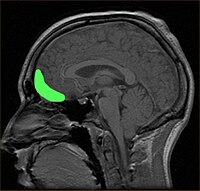
Photo from wikipedia
Saikosaponin d (SSd) is a traditional Chinese medicine that has been widely used in depression treatment. Given the lack of studies demonstrating the underlying mechanism of action of SSd in… Click to show full abstract
Saikosaponin d (SSd) is a traditional Chinese medicine that has been widely used in depression treatment. Given the lack of studies demonstrating the underlying mechanism of action of SSd in depression, the presented study was conducted with aims of investigating the effect of SSd on rats with depression-like behaviors induced by unpredicted chronic mild stress (UCMS) and its underlying molecular mechanism. To investigate the effect of SSd on depression, rat models with depression-like behaviors were established through 3-week exposure to UCMS, followed by administration of 10 mg/kg fluoxetine, 0.75 mg/kg SSd, 1.50 mg/kg SSd, or 10 mg/kg caffeic acid phenethyl ester (CAPE). The depression-like behaviors of rats were evaluated by sucrose preference test, open field test, forced swimming test, and tail suspension test. Afterwards, the regulatory relationship among nuclear factor-κB (NF-κB), microRNA (miR)-155 and fibroblast growth factor 2 (FGF2) were detected by dual-luciferase reporter gene assay and ChIP. RT-qPCR and Western blot analysis was conducted to determine the expression of genes and proteins. Finally, hippocampal neurons were extracted from modeled rats and transfected with miR-155 mimic, miR-155 inhibitor, NF-κB overexpression plasmid, or siRNA against NF-κB. The results showed that the depression-like behaviors induced by UCMS in rats was successfully attenuated by SSd. In hippocampal neurons of rats treated with SSd, NF-κB was significantly downregulated while FGF2 was significantly upregulated. NF-κB targets miR-155 and negatively regulates the expression of FGF2. NF-κB knockdown resulted in reduced depression-like behaviors of rats. These findings provide evidence that SSd could ameliorate depression-like behaviors in the rats treated with UCMS by downregulating NF-κB and miR-155, and upregulating FGF2.
Journal Title: Brain Research Bulletin
Year Published: 2020
Link to full text (if available)
Share on Social Media: Sign Up to like & get
recommendations!